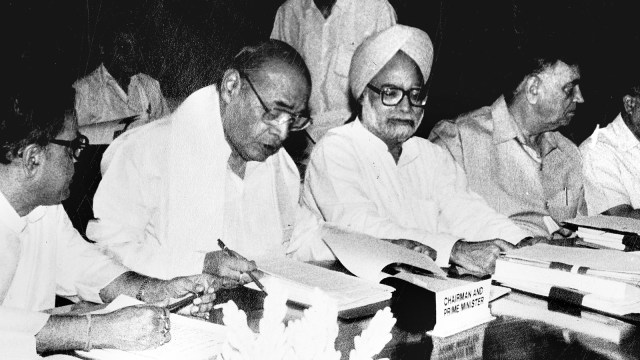Manmohan Singh’s reforms roadmap: Foundation of New India to be set, he said before 1991 Budget
Manmohan Singh a compulsive reformer, and could achieve spectacular results given the crisis with the fullest support of Narasimha Rao.
 Former Prime Minister P V Narasimha Rao with Manmohan Singh at a Planning Commission meeting in July 1993. (Express Archive)
Former Prime Minister P V Narasimha Rao with Manmohan Singh at a Planning Commission meeting in July 1993. (Express Archive)Manmohan Singh was an economist with spectacular domain expertise, but as Finance Minister in PV Narasimha Rao’s Cabinet, he was deeply conscious of the limits of India’s political economy of change.
When he was the FM, I went along with him for a meeting with Petroleum Minister B Shankaranand. I was quite disappointed when he spurned Singh’s persuasion efforts to disinvestment in government oil companies. Shankaranand described these as ‘temples’ built by (Jawaharlal) Nehru.
Manmohan Singh ticked me off. “Nandu, don’t be so impatient, please recognise that governments must survive to reform,” he said. He was deeply conscious of the limits of the political economy of change, of consensus being necessary for political stability. He taught me to be patient with the tardy pace of reforms.
But he was audacious too. He rode on the strength of economic reforms when he became the Prime Minister in 2004. (Atal Bihari) Vajpayee was audacious too — he asserted India’s position on the high table with the second nuclear test in Pokhran. He endured the sanctions.
Riding on the back of the strength of the Indian economy, Manmohan Singh knew we cannot remain away from the mainstream. He knew India needed private investments, and went ahead and signed the civilian nuclear agreement with the US in 2008. Manmohan’s audacity was to risk the arithmetic of political survival of the government. But India had withstood sanctions post 1998, and had emerged stronger. Unfortunately, we are yet to claim the full advantages of this deal by not clearing enabling laws relating to liability of private nuclear players.
Manmohan Singh was cautious, and he was calibrated too in his approach. He was a compulsive reformer, and could achieve spectacular results given the crisis with the fullest support of Narasimha Rao. But he worked under the shadow of Sonia Gandhi, and as Prime Minister he recognised the socialist mindset of the party cramped his style and instincts — he was not his own master.
Vajpayee had one big advantage — he was the leader of his own party, he was the boss, he only had to balance the interests of the organisation. Manmohan Singh was also unfailingly attached to me and all those who worked with him. A new government under him took office on May 22, 2004. I was a Member of the Planning Commission under Vajpayee’s NDA. I called on him personally in June to offer my resignation.
But Singh asked me to take back my resignation indicating he would like me to work with him, and told me to meet him after a conference abroad I was scheduled to attend. He remembered our association that dates back to his first day in government service — I drove him to the Ministry of Foreign Trade; Minister LN Mishra had handpicked him to be his Economic Advisor.
Upon my return, he said it would be problematic for me to continue. I took out my old letter, changed the date and sent him the resignation.
I was the Joint Secretary in the Fund-Bank Division in the Economic Affairs Department when Singh was appointed the Finance Minister. The problems had begun to simmer much before, and when he came as the FM, the Balance of Payments position had turned into a full blown crisis. In fact, his very appointment by Narasimha Rao was to show to the International Monetary Fund and the World Bank a face with impeccable international credentials.
He was the most logical choice (earlier IG Patel had refused) and was key for India not defaulting on its debt. India had to get out from the delicate BoP position. As Joint Secretary, Fund-Bank in the Ministry of Finance, I called on him. He greeted me warmly. “India has suffered a lot, but we would now set the foundations of New India,” he remarked. I left the room a bit puzzled. I realised on June 21, 1991, he was referring to the contours of the Budget speech thereafter.
The writer is former chairman, 15th Finance Commission.







